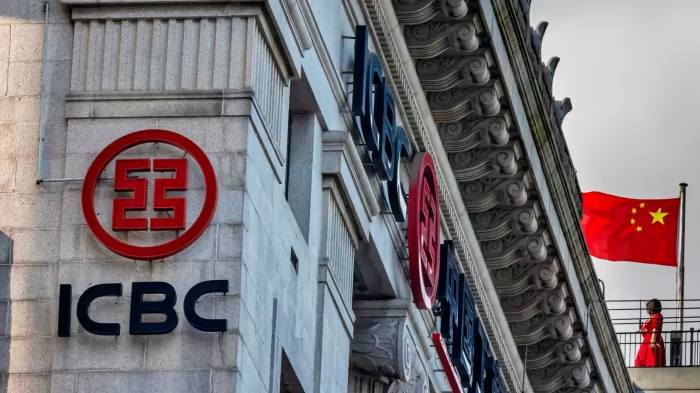Receive free World updates
We’ll send you a myFT Daily Digest email rounding up the latest World news every morning.
Chinese lenders stepped in to extend billions of dollars to Russian banks as western institutions retreated from the country during the first year of Moscow’s invasion of Ukraine.
The moves by four of China’s biggest banks are part of Beijing’s efforts to promote the renminbi as an alternative global currency to the dollar.
China’s exposure to Russia’s banking sector quadrupled in the 14 months to the end of March this year, according to the latest official data analysed for the Financial Times by the Kyiv School of Economics.
The lenders took the place of western banks, which came under acute pressure from regulators and politicians in their home countries to exit Russia, while international sanctions made doing business much harder.
“The loans by Chinese banks to Russian banks and credit institutions, which are for the most part a case of the yuan taking the place of dollars and euros, show the sanctions are doing their job,” said Andrii Onopriienko, deputy development director at the Kyiv School of Economics, who compiled the data. Here’s more on Russia’s embrace of the renminbi.
-
Chinese economy: China’s slowing growth is sparking warnings of contagion in Asia, as waning consumer demand and slower manufacturing hit the region.
Join FT correspondents and expert guests for a subscriber event to assess the implications of China’s economic slowdown and its struggle with deflation. Submit your questions and register for free here.
Here’s what else I’m keeping tabs on today:
-
Grain deal: Turkish president Recep Tayyip Erdoğan and Russia’s Vladimir Putin meet in Sochi to discuss restarting the export of grain through the Black Sea. Moscow’s forces launched a massive drone attack on Ukraine’s southern Odesa port region yesterday ahead of talks.
-
Economic data: Germany reports July trade balance figures.
-
Markets closed: The US celebrates Labor Day.
-
UK politics: The House of Commons and House of Lords return after the summer recess, enabling a writ to be published for the Mid Bedfordshire by-election triggered by the long-delayed resignation of former culture secretary Nadine Dorries.
Five more top stories
1. Exclusive: The London Stock Exchange Group has drawn up plans for a new digital markets business, claiming that this will make it the first major exchange to offer extensive trading of traditional financial assets on the blockchain technology best known for powering cryptocurrency. Read the full story.
-
Opinion: In the face of a long, cold winter, the LSE’s efforts at getting a foothold in private capital and building bridges to the public markets are worth a try, writes Helen Thomas.
2. Global growth is likely to slow next year due to persistently higher interest rates in major economies, with output expanding 2.1 per cent, according to an aggregation of forecasts. This is down from the 2.4 per cent estimate for this year, partially a result of base effects from unexpectedly strong consumer demand and labour markets this year. Here’s more details on the downgrades for 2024.
3. Volodymyr Zelenskyy has said he will replace his defence minister, Oleksiy Reznikov, in a move that marks the biggest shake-up to his government since Russia launched its full-scale invasion last year. Rustem Umerov, currently overseeing Ukraine’s privatisation agency, will take up the role. Here’s why the president is making the move.
4. British banks are on a push to increase office attendance as they call time on the work-from-home era. Lloyds Banking Group is launching a charm offensive including free food for staff who are required to spend at least two days a week in the office, highlighting efforts by UK employers who see remote work as productivity-sapping.
5. Exclusive: The EU’s plans to ban combustion engine vehicles is stoking a price war with Chinese carmakers, the chief executive of BMW has said, warning of the “imminent risk” facing European manufacturers from competitive rivals in China producing electric cars. Here’s more from the FT’s interview with Oliver Zipse.
-
Batteries race: Chinese manufacturers are exploiting state subsidies to build battery plants at a speed far outpacing domestic demand, raising fears the country will squeeze out global competition.
The Big Read
Dried-up rivers are becoming an increasingly common sight in England, which endured its hottest June on record. Restrictions on hosepipe use are becoming an annual phenomenon, and one region ran out of supplies this summer. How is it that an island noted worldwide for its soggy climate can struggle so frequently to keep its waters flowing?
We’re also reading . . .
Chart of the day
The after-effects of a surge in European energy prices have meant the region is facing a stickier inflation problem than the US. Investors and analysts are increasingly warning of the risk of transatlantic divergence in economic fortunes and the responses of policymakers.
Take a break from the news
One of China’s four great cuisines, Cantonese food is best known in the west as a cheap takeaway. But restaurants such as The Chairman in Hong Kong are changing perceptions abroad. Owner Danny Yip tells FT Magazine why the well-known Chinese regional cuisine is not what you think it is.
Additional contributions from Benjamin Wilhelm
Read the full article here

